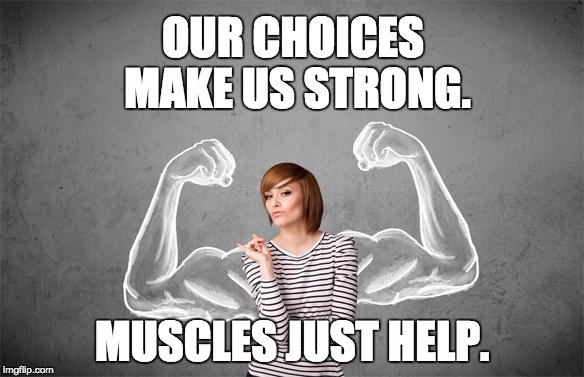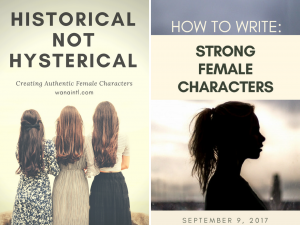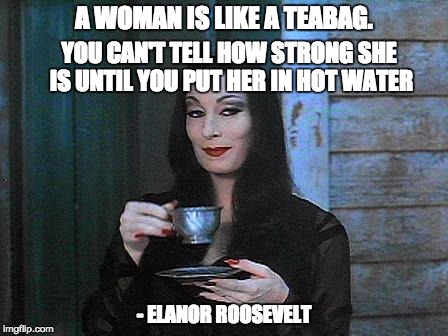It’s Squatter’s Rights Wednesday, which means it’s me, Cait Reynolds, coming to you with special guest blogger Lisa Hall-Wilson. It’s a good thing I have a co-blogger today, because I’m on day 14 of a cold and feel like lukewarm coffee – just ugh and barely effective.
Denny Basenji doesn’t like it when I sneeze, so he spends most of his time hiding in his blanket fort.

Denny: Why get a cave bed when you can have your mama custom-drape a blanket fort for you?
If I had the energy, I’d actually be really excited about today’s guest blog post because Lisa and I are also teaching a workshop on this topic in September. We are going to be talking about how to create strong, authentic female characters in fiction. Lisa is specifically focusing on how to avoid extremes, tropes, and types. I will be talking about how to TRULY get into the mindset of historical female characters and what defines strong for them (which is going to be another blog post).
Okay, over to Lisa!
Character, not caricature.
Lisa here! Portraying strong women authentically is tricky. Most of the time, I find strong female characters are caricatures of an extreme: the dim-witted blond, the stock-in-trade man with boobs, the femme fatale. These are stereotypes sure, but what they really are is extreme examples of real life. Can you find an example from history of a female warrior in a male-dominated society – sure, but she’s an outlier. If you want to write an outlier character that’s fine, but let the traits that make her an outlier be the source of her strength not her ability to wield a sword.

Let’s look at a real-world example, Malala Yousafzai. She’s a strong woman, but is she strong because she survived a bullet wound to the head? Yes, partly, but moreso she’s strong because of the choices that led to her being targeted, and the friends and family who empowered her to follow her heart.
Are you able to portray women without these extremes that’s both likable (or at least worthy of cheering for) and surprises readers? That’s the tricky part.
Brave, not dumb.
I love to study Amazons, that mythical race of female warriors written of by the Greeks. The truth is that Amazons were a cautionary tale for their times. This is what might happen if women could make their own decisions about marriage, family, war or the economy. Exotic? Dangerous? Lust-worthy? Absolutely. But in nearly every Greek tale, the Amazons inevitably rush headlong into battle over pride or vanity and are overwhelmingly outnumbered against a professional army. That’s not heroic, it’s stupid. Most women, especially strong women, are not stupid.
The danger with the extremes is that characters become one-dimensional. The only reason that character exists is because the hero needs a woman to encourage him. You have no story-based reason for making that character female other than you liked that idea, needed a victim to motivate a male character to act, a reason to insert sex, etc. There was nothing about being female that placed obstacles in her path or helped that character succeed.
Ever did that experiment where you write on a coffee filter with a black marker, get the filter wet and see the variety of colors that went into making black? Strength is like the colors that make up that black marker. Strength is not one thing or act, just like black is not a primary color, but it’s your job as the writer to show all the different colors that make up that character’s strength.
Truth is a subtle strength.
Let’s look at Veronica Roth’s Tris. One of the first things we learn about her is that she chooses to leave Abnegation and join Dauntless because she knows herself and must be true to that. She makes that choice knowing what some of the consequences will be. That’s strength. There are a lot of natural obstacles in her way (one of them being female without any athletic training competing against guys), but she’s not afraid to make friends or find an ally. Being a lone wolf can represent strength but it’s also a self-protection mechanism rooted in fear.
I love 100. I know a lot of people point to Clarke as a strong character, but personally I’m more drawn to Octavia and Raven. These are girls who have fought their way to influence in a variety of ways and through painful personal sacrifices. We’ve seen them as outliers and leaders, run from pain, lash out in anger, deny their own desires, and escape from life. They are intelligent, courageous, fighters, who love, grieve, chase, hate, forgive – the whole spectrum. And each time they get knocked down, they blunder and stumble, but then they get stronger. That’s real life.
Female characters need to be strong, but they need to be real, varied, unique, and as individual as possible.
Want to get more in depth?
Check out the workshop that Lisa and I are offering in September!
Now and Then: Strong Female Characters in Historical and Contemporary Fiction

Instructors: Cait Reynolds and Lisa Hall-Wilson
Price: $70.00 USD
Where: W.A.N.A. Digital Classroom
When: Saturday, September 9, 2017. “Historical not Hysterical” 11:00 a.m.-1:00 p.m. EST. “Beyond Lipstick and Swords” 2:00-4:00 p.m. EST
 From fainting virgins to sexually-empowered widows, the ‘historical heroine’ attempts to accomplish the near-impossible: capture the sensibility and reality of the times while keeping the heroine relatable to modern readers.
From fainting virgins to sexually-empowered widows, the ‘historical heroine’ attempts to accomplish the near-impossible: capture the sensibility and reality of the times while keeping the heroine relatable to modern readers.
Until we get time machines, we have to rely on research and our imaginations in order to create authentic, sympathetic historical heroines. The amount of research required can seem daunting, but this class is designed to give you a ‘jump start’ with some basic facts, tricks for getting into your heroine’s head, and hints on how to research efficiently and with confidence.
This class will cover the following topics – and much more:
- Vital statistics: how to determine the correct age for your female character based on time period;
- The Three E’s: Education, Entertainment, and Etiquette;
- Dressing the part: how to capture the feel of an era’s fashions without Mary Sue shopping sprees;
- Housekeeping from princesses to privy pots;
- The Three F’s: Faith, Fierceness, and Fiancés. What your female character believes is her destiny and what actually is her destiny;
- Tips and tricks for quick research.
A recording of this class is also included with purchase.
About the Instructor:
 Cait Reynolds is a USA Today Bestselling Author and lives in the Boston area with her husband and four-legged fur child. She discovered her passion for writing early and has bugged her family and friends with it ever since. When she isn’t cooking, running, rock climbing, or enjoying the rooftop deck that brings her closer to the stars, she writes.
Cait Reynolds is a USA Today Bestselling Author and lives in the Boston area with her husband and four-legged fur child. She discovered her passion for writing early and has bugged her family and friends with it ever since. When she isn’t cooking, running, rock climbing, or enjoying the rooftop deck that brings her closer to the stars, she writes.
 Want to create strong female characters with depth and vitality but avoid clichés and tired tropes? This class will explore the pitfalls and old ruts writers fall into when creating strong female characters, and what to strive for instead. Because what if your character doesn’t wield a sword or own a power suit – are they still strong?
Want to create strong female characters with depth and vitality but avoid clichés and tired tropes? This class will explore the pitfalls and old ruts writers fall into when creating strong female characters, and what to strive for instead. Because what if your character doesn’t wield a sword or own a power suit – are they still strong?
Learn what’s missing from many depictions of strong female characters and how to write them in a realistic way even if you’re writing fantasy! Joss Whedon isn’t the only one who can write strong female characters – and Wonder Woman isn’t the only type of strong female character you can write.
Some of what you’ll learn:
- What makes women strong;
- Making female warriors believable;
- Shaping societal forces;
- Women are not men;
- Women in community;
- Character agency.
Lisa Hall-Wilson is an award-winning journalist and novelist, and writing teacher. She grew up watching and reading about women like Wonder Woman, Princess Allura, Jo March, She-Ra, Catherine Chandler, Jessica Fletcher, and other less notable characters. After realizing she was repeating all of the tired tropes and stereotypes she hated, Lisa spent months studying strong female characters and learning what makes them authentic and real.
How This Class Works…
After registering, you’ll be sent an email confirmation which will provide you with login information for the online classroom we’ll be using. This class will be recorded so if you’re not able to make it in person you’ll have the recording within two or three days. Come prepared with a sense of humor and a notepad. Yes, this class will be recorded if you can’t make it live, but you want to be there!
About the Instructor
 Lisa Hall-Wilson is an Award-Winning Author and Journalist and she LOVES to mentor writers. She’s been a freelance writer for ten years turning her love of words into an income. Her passion is to help beginning writers hone their skills and become published storytellers, so look for her classes to go beyond basics and challenge you.
Lisa Hall-Wilson is an Award-Winning Author and Journalist and she LOVES to mentor writers. She’s been a freelance writer for ten years turning her love of words into an income. Her passion is to help beginning writers hone their skills and become published storytellers, so look for her classes to go beyond basics and challenge you.
NEW CLASSES FOR SEPTEMBER AND MORE!
All classes come with a FREE recording!
We’ve added in classes on erotica/high heat romance, fantasy, how to write strong female characters and MORE! Classes with me, with USA Today Best-Selling Author Cait Reynolds, award-winning author and journalist Lisa-Hall Wilson, and Kim Alexander, former host of Sirius XM’s Book Radio. So click on a tile and sign up!
[abcf-grid-gallery-custom-links id=”22482″]









14 comments
2 pings
Skip to comment form
Interesting post.
I am also okay with her femaleness not coming into play at all in a heroine’s story. I don’t think it always has to be central to her trials for the book to be a good story.
There was an article out some time ago about a little girl deciding Merry in LotR is a girl. It was a very well written article I can’t find now, but it points out that maybe it’s okay for women to be depicted just doing things. That it’s okay for our daughters to see that it’s no big deal that they are girls doing a thing.
I believe there is room in fiction (and real life!) to let characters be characters without involving gender. Without it being a big deal a woman joined Sam to take the ring to the mountain. To write her as you would a male character.
Yes, you make a good point. I’m also drawn to characters that could be male or female as long as they have what Chuck Wendig calls “agency” or the ability to move the story forward.
Enjoyed your post and glad you mentioned The 100. It’s one of my favorites too and the characters you mentioned. A thing I don’t like about the way some authors write their strong women characters is to make them act like men. They don’t have to kick ass or cold and emotionless to be strong. They can be warm and kind and have no special physical strength.
Yes, being physically strong isn’t what makes a woman strong, rather things like courage, integrity, values, kindness, etc.
One of the problems is that we started out with very few good examples. The books I read growing up–if they had women characters–tended to be victims for the hero to rescue. They often weren’t characterized beyond victim. They didn’t do anything, or even try, to help themselves.
Even now, I think some writers go over the top to justify why they have a woman character in a story like it was something special. Heck, I was in the Army, and there were more women in my unit than I’ve seen in a book with a cast as big as my unit–and we didn’t have all that many women. But we were in double digits, and the book worked at getting only one into the story, in a very small role.
The other problem, I suspect, is that some writers are thinking they have to have a woman character for the women readers, so they’re flipping over a male character to female. There are some traits that work pretty well with male character that will look awful on a woman character.
Well, I think there have always been strong female characters but our definition of strong has changed and you’re right, there were never very many overall or in one story. I’m thinking of Jane Eyre who was willing to be alone in a time when all women married. Jo March from Little Women, Hester Prynne from The Scarlet Letter, Anne Shirley, Laura Ingalls Wilder, Trixie Belden, etc. I think of Lisbeth Salander, who is strong in a much different way than what we might normally think of. (lol – now you’ve got me started…)
Very interesting Post. I had not heard of the 100. Discovered that they are up to Season 4. I look forward to watching especially, the Characters you mention, Octavia and Raven. I will also be checking out the book by Kass Morgan.
Haven’t read the book. You’ll have to tell me if you enjoy it.
Fun to see you reference The 100! (A favorite of mine) I like Raven, myself, as an example of strong characters. Also Maya and Emori for minor ones. Love the post! It’s nice to have a reminder that strong character doesn’t mean physically strong but complex and nuanced, for good or bad.
Yes, there’s many strong female characters in 100 which impressed me. Usually you see one or maybe two, but this show has several who are all strong in different ways.
My favorite historical novels were written by Ann Rinaldi. She kept the characters authentic, and while they were all female, the fact that they were women was minor. They were people central to the plot, not just a woman included for diversity’s sake. Those are my favorite types of stories where the focus is on action and character, not whether the protagonist is a man or a woman.
wow, absolutely everything one needs to know to create a female characters to carry the load of the modern woman!
(But aren’t we all modern women…no matter what era we find ourself in?)
I look forward to Indulging in your workshops this fall and winter!
I’m not always liking the “Strong” female characters I see these days. Being “true to their self” often means being self-centered, and strong often means smart-mouthed and abrasive. I think we need to get back to women (are we afraid to be who we are?) being compassionate and loving? Thinking of others more than themselves. Now that is real strength!
[…] I am guest posting over at Kristen Lamb’s blog today on how women should be brave not stupid. […]
[…] https://authorkristenlamb.com/2017/08/the-write-stuff-creating-strong-authentic-female-characters/ […]